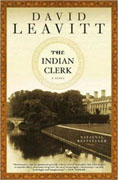The Indian Clerk
David Leavitt
book reviews:
· general fiction
· chick lit/romance
· sci-fi/fantasy
· graphic novels
· nonfiction
· audio books
· author interviews
· children's books @
curledupkids.com
· DVD reviews @
curledupdvd.com
newsletter
win books
buy online
links
home
for authors
& publishers
for reviewers

 |
The Indian Clerk David Leavitt Bloomsbury USA Paperback 496 pages September 2008 |
|
In this bold, expansive novel, author David Leavitt brings to life the world of Edwardian England through the relationship between British mathematician G. H Hardy (1877-1947) and the Indian-born genius Srinivasa Ramanujan (1887-1920). Godfrey Harold Hardy was best known for his achievements in number theory and mathematical analysis, but it is his work as a mentor, from 1914 onwards, of Ramanujan that is most widely celebrated.
Hardy's trusted collaborator J. E. Littlewood immediately concludes that these results "must be true because, if they were not true, no one would have had the imagination to invent them." As a result, Hardy, buoyed by his sense of ambition to finally solve the Riemann hypothesis, enjoins his best friends, Eric and Alice Neville, to travel to India in order to bring Ramanujan to England. Upon their arrival in Madras, Alice writes a series of letters to Hardy's sister, Gertrude, telling her much about Ramanujan and how he grew up poor in South India. A promising student, the boy proved to be totally engaged in mathematics and was locally renowned for winning academic prizes in high school. Ramanujan certainly sees the potential opportunities that Hardy is willing to afford him, but his deeply religious mother fears the great cultural gulf that separates India from England and both the social and spiritual consequences of having her son break the rules of his caste and cross the seas. Still, to England Ramanujan comes. Upon his arrival, he is cared for by the Nevilles, who make him feel at home by feeding and bedding him while showing him how to navigate the byways of Cambridge and the stuffy corridors of Trinity College. It is here that Ramanujan begins his very successful five-year collaboration with Hardy that endures throughout the enormous social and political upheavals of the time. It is also here in England that Ramanujan must face the difficulties of being a brown-skinned man in an all-white world, besides coping with the alien culture, the harsh winters, and the strange English customs, including the foods that he can never quite comprehend. With the arrival of World War I, the English are gradually beaten down by unremitting German bombings, which only make things worse for Ramanujan, who is eventually hospitalized with a strange illness, his doctors ultimately fearing for his life. Most of the action in The Indian Clerk This novel, however, is not just about Hardy's triumphant professional relationship with Ramanujan, but also about his friendships over the years with Littlewood and the Nevilles, his sister Gertrude, and the men in the elite society of the Apostles, such luminaries as Bertrand Russell, John Maynard Keynes, and G. E. Moore. Hardy was a committed atheist and, according to those who knew him best, particularly Littlewood, a "non-practising homosexual." To his credit, Leavitt doesn't shy away from presenting this intimate side of Hardy's life as he embarks on a stormy affair with a wounded working-class soldier who has just returned from the front lines, while still remembering the great love of his life, Russell Gaye, who committed suicide and who periodically comes back to haunt Hardy in his dreams. Although the mathematical tabulations do weigh the story down a bit, their inclusion is important because it adds to our understanding of Hardy and Ramanujan's love of numbers and the degree to which they possessed such incredible ability to manipulate them. In the end, The Indian Clerk Originally published on Curled Up With A Good Book at www.curledup.com. © Michael Leonard, 2007 |
| Also by David Leavitt: |
|
|
|
 Click here to learn more about this month's sponsor! |
|
| fiction · sf/f · comic books · nonfiction · audio newsletter · free book contest · buy books online review index · links · · authors & publishers reviewers |
|
| site by ELBO Computing Resources, Inc. | |
 "I did not invent him, he invented himself, and my association with him is the one romantic incident in my life," says Hardy, when in 1936 he begins a speech in the New Lecture Hall at Harvard University. Back in 1913, Hardy received a strange letter from an unknown clerk in Madras, accompanied by nine dense pages of mathematics containing theorems on infinite series, improper integrals, continued fractions, and an attempt to prove the "Riemann hypothesis."
"I did not invent him, he invented himself, and my association with him is the one romantic incident in my life," says Hardy, when in 1936 he begins a speech in the New Lecture Hall at Harvard University. Back in 1913, Hardy received a strange letter from an unknown clerk in Madras, accompanied by nine dense pages of mathematics containing theorems on infinite series, improper integrals, continued fractions, and an attempt to prove the "Riemann hypothesis."